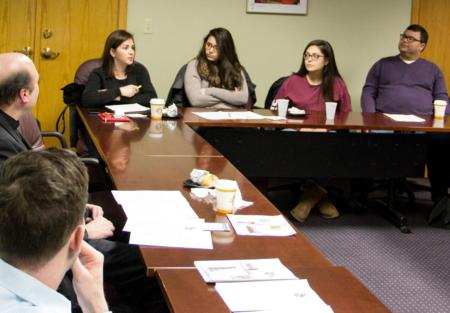Committee studies ways for parishes to better serve those with autism
BRAINTREE -- Ideas on how to make parishes within the Archdiocese of Boston more accessible and welcoming to people with autism spectrum disorder were eagerly passed around the archdiocese's second Autism Study Committee meeting held at the Pastoral Center, Feb. 18.
Comprised of family members of people with autism and religious educators, the committee was founded through efforts from the Office for Persons with Disabilities, which is part of the Office of Outreach and Cultural Diversity.
The committee was created to help the office provide better outreach to the community and to draw awareness to autism.
"This committee, it is a voice," said Father Michael Harrington, director for the Office of Outreach and Cultural Diversity.
The committee's efforts were jump-started by a grant from the Catholic Health Foundation and the Catholic Community Fund.
While a number of ideas were discussed during the group's meeting, a few core ideas kept coming back, including having parishes hold Masses especially tailored to people with autism, with limited noise or incense, and stocking parishes with faith-based reading materials that are easy for individuals with autism to understand.
However, it was the idea of developing parish support groups for families with autistic family members that seemed to resonate with the committee members.
"When somebody is first diagnosed, (families) need to not only have some kind of pastoral counselling, they need to meet other families in the same situation," said committee member Cathy Boyle, who is president of Autism Housing Pathways, an organization that helps provide housing solutions to adults with development disabilities.
Zina Gomez-Liss and Jeff Liss, parents of five children, two of whom have autism, spoke about how a parish support group would benefit them.
"We just moved from Cambridge to Newton, and we're very new... there's no one that looks forward to us when we go to church," said Zina.
The couple said people have frequently asked them to "control their children," not understanding that they have a disorder.
"Autism is a very invisible disability, and so it just looks like a kid that can't behave themselves," Zina Gomez-Liss said.
Although parishioners are beginning to recognize the family's situation, a support group could help them meet others in the community who are experiencing similar hardships.
One of the more tangible ideas discussed was the initiative to create pew cards that would contain information on autism, such as its symptoms, as well as suggestions for parishioners on how to treat or talk to someone with the disorder.
For the committee's next meeting in March, members will think of information to put on the pew card.
Families who are impacted by autism and wish to inquire about programming for their parishes can contact Robert Kavanaugh at 617-746-5791.



















